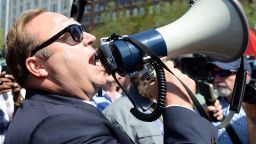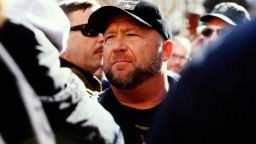Editor’s Note: Nicole Hemmer is an associate research scholar at Columbia University with the Obama Presidency Oral History Project and the author of “Messengers of the Right: Conservative Media and the Transformation of American Politics” and the forthcoming “Partisans: The Conservative Revolutionaries Who Remade American Politics in the 1990s.” She cohosts the history podcasts “Past Present” and “This Day in Esoteric Political History.” The views expressed in this commentary are her own. View more opinion on CNN.
“Jesse was real. I’m a real mom.”
It’s an unthinkable statement for a grief-stricken parent to have to make: testifying that her 6-year-old son, murdered while he sat in school, had actually lived, and that she was the woman who had given birth to him and raised him for the too-few years he was alive. But that was the testimony Scarlett Lewis gave this week at a hearing to determine damages against Alex Jones, a conspiracy theorist and media personality. (Jones was held responsible for defamation in a default judgment earlier this year.)

After 20 children and six adults were murdered at Sandy Hook Elementary School in 2012, Jones began to spin lurid conspiracies that the shootings never happened and that the shattered families were simply actors. The conspiracy triggered years of harassment as conspiracists targeted the mourning parents, who have had to hire security to protect themselves. Since the defamation suits were filed, Jones has apologized and claimed he was in the grip of a “form of psychosis” that caused him to believe the conspiracy theory.
The Sandy Hook conspiracy made Jones the talk-radio equivalent of the Westboro Baptist Church, which staged vile anti-gay protests at soldiers’ funerals. But within just a few years, Jones would become part of the right-wing power structure, from his interviews with soon-to-be president Donald Trump to his alleged role as an organizer at the January 6 insurrection.
More than that, many in the Republican Party and conservative movement increasingly sound like Jones, with talk of false flags, crisis actors and pedophile rings now a mainstay of right-wing rhetoric. And while the Trump presidency opened the door for the mainstreaming of Jones, it’s important to understand how ripe the GOP was for Alex Jonesification.
From its beginning in the 1940s and 1950s, the modern conservative movement embraced a conspiratorial mindset. From books that argued former President Franklin Roosevelt allowed the Japanese to attack Pearl Harbor to unite Americans behind him in war, to the anti-fluoridation conspiracies of the John Birch Society, to the communist-around-every-corner witch hunts of the McCarthy era, conspiracy theories have become a core component of conservatism in America.
But with the exception of McCarthyism, the conspiracy-minded right remained distinct from the Republican Party. Even right-wing politicians, especially those eyeing the presidency, shied away from the wild-eyed conspiracy-mongers popular with their conservative base.
That changed in the 1990s, as politics, entertainment and conspiracy became increasingly intertwined. Pat Robertson, the televangelist who ran for the Republican presidential nomination in 1988, published his conspiracy tract, “The New World Order,” in 1991. Drawing from several decades’ worth of conspiracies about “one-world government,” Robertson detailed a coalition of the Trilateral Commission, Illuminati, Bilderberg Group, Free Masons and others working to bring about a single global governance and, ultimately, the End Times. It was a New York Times bestseller.
Robertson wasn’t the only Republican presidential candidate warning about the new world order. It became a staple of Pat Buchanan’s speeches in all three of his presidential runs between 1992 and 2000. And while the phrase spoke to anxieties about the geopolitics of a post-Cold War world, it also nodded to the conspiracy theories that were becoming increasingly popular not just among the conservative base but for Republican officeholders as well. During the Clinton years, members of Congress held inquiries into black helicopters (a staple of 1990s conspiracies) and mainlined countless conspiracy theories about Bill and Hillary Clinton.
Outside of Congress, the newly powerful right-wing radio of the 1990s and 2000s likewise paved the way for an embrace of Jones. Glenn Beck’s radio program cycled through conspiracies with breathtaking speed, pinging from Common Core to George Soros to Agenda 21, a United Nations-based conspiracy theory. He mixed politics and conspiracy not only in his content but his advertising.
Warning that the End Times were near, that catastrophe lurked around every corner, Beck pushed everything from gold to food storage to “survival seeds,” all aimed at helping listeners survive the impending collapse of society. (In the years since, Beck has admitted that he “played a role, unfortunately, in helping tear the country apart.”)
These threads came together in the Obama years, as Beck became one of the most prominent voices in the Tea Party movement and conspiracism ran rampant on the right. That provided real opportunity for someone like Jones to make headway in US politics. While his grotesque Sandy Hook conspiracies did not gain traction in Republican circles, others did, such as the Jade Helm 15 conspiracy of 2015. Jones turned the routine military exercise in Texas into a new conspiracy theory, telling his audience falsely that it was a covert government effort to prepare for martial law.
That conspiracy theory quickly escaped InfoWars circles, making its way to right-wing talk radio and to Republican politics. Texas Gov. Greg Abbott ordered the state militia to monitor the exercise. Sen. Ted Cruz of Texas, preparing for a presidential bid, also legitimated the conspiracy, saying that while he’d been assured by the military that it was a routine training exercise, “I understand the reason for concern and uncertainty, because when the federal government has not demonstrated itself to be trustworthy in this administration, the natural consequence is that many citizens don’t trust what it is saying.”
Get our free weekly newsletter
Cruz’s pivot helps explain why the space between Jones and the GOP collapsed in the 2010s. The Republican Party spent decades arguing that government was corrupt, if not illegitimate, and grew increasingly reliant on right-wing media for the party’s messaging. So, it took very little effort to tip over into the world of wild conspiracies – especially once, with the election of Trump, Republicans realized there would be no price to pay for doing so.
The last few years have suggested that the bill is coming due – Trump lost the presidency and the Congress, Jones lost his defamation trial and several right-wing media outlets are facing hefty defamation suits for their election conspiracies. That hasn’t yet curbed the party’s conspiracy-mongering, though.
Indeed, Alex Jones may never speak at a Republican convention or become a part of the Fox News primetime lineup. But he doesn’t have to. His conspiratorial thinking, rhetoric and style are now well-integrated in the Republican Party, a legacy not only of the Trump years but of decades of conspiratorial politics.






